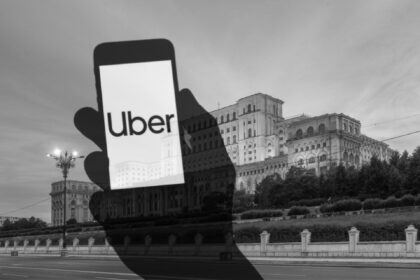
Secret communications within Uber, the American behemoth that has changed passenger transportation worldwide, expose illegal expansion strategies into other markets.
Recent events revealed a big scandal regarding the Uber Company. The Guardian revealed secret documents on how tech giant Uber broke the law, conned the police, took advantage of violence against drivers, and clandestinely lobbied governments during its ambitious global development.
In order to operate the powerful machinery of policymakers, the firm has spent a large quantity of money to hire an army of outside consultants.
More than 100 politicians and decision-makers from 17 different countries, including Emmanuel Macron and Joe Biden, as well as members of the European Parliament and European Commission representatives, were met by Uber representatives between 2014 and 2016. Representatives of Uber sought political backing at the highest levels in Romania as well.
Uber has „collaborated” with many top politicians in Romania to change legislation. Emails from the Uber office in Romania identifying the lawmakers who need to be contacted were included in the records.
Lobbying in Romania
In Romania, professional lobbying is just getting started, but like everywhere else, the largest volume of influencing activity is made by trade associations, corporations, non-governmental organizations (NGOs), civil society, syndicates, employer unions, think tanks, lawyers, and other individuals and groups. The law governing lobbying in Romania was drafted there. The legislative initiative defines lobbying as „any contact person organized and structured to exert influence on public representatives in the interest of a client.” Controlling lobbying activities is a prominent aspect of Romania’s political process and is a constitutionally protected right.
However, Uber wanted to impose the cab-hailing service in Romania and worldwide, even if it meant breaking the law and going against taxi rules.
The data reveals how Uber attempted to win back support in Romania by covertly contacting political figures and high-position leaders.
About the Uber Files investigation in Romania
Uber has been touted as a leader in the digital revolution, yet it has turned to outdated methods to win over powerful politicians.
Since 2015, when Uber started operating through a subsidiary in Romania, Uber has managed to amend the law on the prohibition of passenger transport for a fee without a taxi license into the regulation of all passenger transport operations urban-type.
According to a Rise Project investigation, the man who could ensure the connection between Uber and the political area was Peter Imre, who died in the meantime. Peter Imre was the director of Adevarul Holding and an influential local consultant with multiple political connections in Romania.
Through Peter Imre, Uber was able to appeal to the Minister of Transport Ioan Rus, with Iulian Matache, Secretary of State in the Ministry of Transport, Mircea Toader, the Vice President of the Transport Committee in Parliament, responsible for amendments to the taxi law, Catalin Popescu-Tariceanu, Senate President, Bogdan Chiritoiu, the president of the Competition Council, Sorin Grindeanu, the minister for the Information Society, and many others, to convince them to appoint a parliamentarian from each party to introduce the legislative changes that Uber needed.
In 2015, as the local cab faced growing customer dissatisfaction and piracy, Uber entered the contest to dominate the Romanian market. When Uber’s operations in Romania were not regulated, taxi drivers began to demonstrate, and some professional associations filed lawsuits for unfair competition.
At the moment, the Uber files case is under investigation, it is not known who will be prosecuted, but according to the journalists, there are many charges in high positions.




